-
THE BEAST IN THE JUNGLE (Clara van Gool 2019)
CLARA VAN GOOL: THE BEAST IN THE JUNGLE (2019)
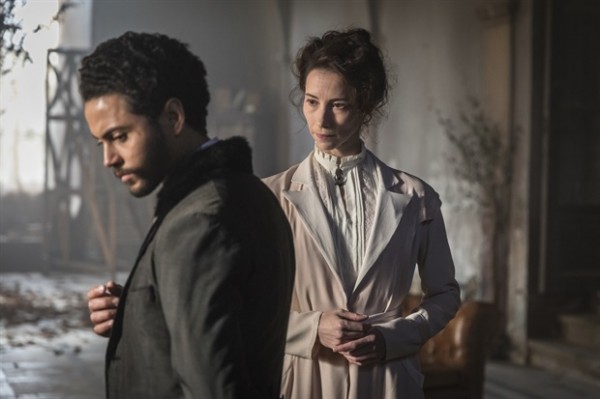
DANE HURST AND SARAH REYNOLDS IN THE BEAST IN THE JUNGLE
A version of the Henry James novella by a Dutch director who interprets it as a dance film
This film presumably relates to last year's Vineyard Theater production, unless great minds just think alike. Both are free versions of Henry James's novella about a man who thinks himself destined for some great thing, who proves more successful in business than love, and has recurrent encounters with a woman over a long span of time. The New York stage version, by director-choreographer Susan Stroman, composer John Kander and writer David Thompson had lots more characters and a richer plot. The Dutch Clara van Gool’s film is stingy with the dancing at first, and stingy with other characters throughout. From current evidence, and what reviews say, neither of these efforts was really successful.
The film is beautiful and haunting. It's also repetitious, intentionally so. The same refrains are repeated over and over. There is a circular effect. This man and this woman (Sarah Reynolds and Dane Jeremy Hurst) literally are dancing around each other - whether in turn-of-the-century clothing, dressed for WWI, or dancing the Twist. I liked seeing the pretty young gentleman and severe, dancerly woman in old-fashioned dress; the English country estate; the beautiful Italian places; the handsome cars are handsomely photographed, often in a dim, haunting light. But over time one wearies of the mixture of dialogue with dance, without the dialogue's counteracting the essential abstractness or impressionism of dance. And in the weird repetitious dialogue and inexplicable shifts of place this becomes Henry James meets Last Year at Marientbad.
Given its Dutch creative origin and its oddity, the film's s Rotterdam premiere was doubly logical. It came my way as part of the San Francisco Film Festival. Juno Films will premiere the film in New York later in 2019 and is planning a rollout to theaters across the US. Prepare yourself for aesthetic pleasure, extended a little beyond the allowable attention span. If you crave a look for an experimental use of classical dance in a beautiful film setting, this may interest you. Warning: this is more like an art piece than a conventional film. Logically, it shows at a museum.
The Beast in the Jungle, 87 mins., debuted at Rotterdam; also showed at Göteborg. Opened in the Netherlands 14 Mar. 2019.
SFFILM showtimes:
Tue, Apr 16 at 6:00 pm SFMOMA
Wed, Apr 17 at 8:45 pm Creativity Theater
Last edited by Chris Knipp; 04-10-2019 at 12:08 AM.
-
Belmonte (Federico Veiroj 2018)
FEDERICO VEILOJ: BELMONTE (2018)
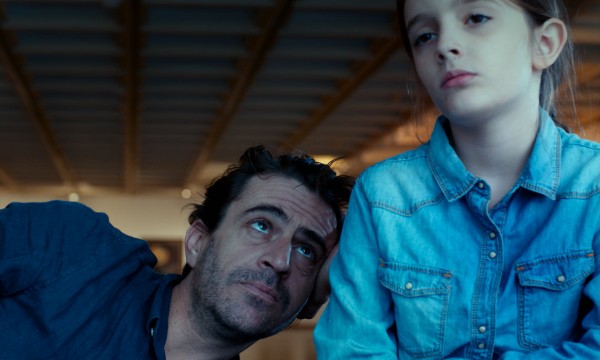
GONZALO DELGADO AND OLIVIA MOLINARO EIJO IN BELMONTE
Portrait of fatherhood in crisis, and the strength of a child
I reviewed Veiloj's 2010 A Useful Life first, at San Francisco. His 2015 [I]The Apostate [/I]came my way via New Directors. On the second go I concluded this director's aim is "to make minorness interesting, and somehow significant." He also likes to star people he knows, who aren't really actors. Let's note how Jonathan Holland defines what's new in this third film in his Hollywood Reporter review. It has "greater emotional range," "also less playful, more austere and generally more forbidding.". As a common thread, though, one might mention (Holland again) his "engagingly fastidious and quirky directorial style. That's key to the aim I see of making minorness interesting, and somehow significant.
Belmonte (Gonzalo Delgado) is tall, like Veiroj himself and his other friend-actor-protagonists, with a serious, Latin, European face, handsome in a pleasingly worn way, weary eyes, lined brow, swaths of brown hair, effortlessly, casually stylish in jeans and shirt and aged leather jacket. He's an artist (as is Delgado in real life, and the work really his own, which I, as an artist, find unusual and quite a good thing). His artwork is doing alright, apparently. He sells two of his big paintings, male nudes, bought by a husband for his wife (Cecilia Jeske), who comes on to him when he delivers them. He withdraws. He has a smart and beautiful daughter, Celeste (Olivia Molinaro Eijo), a schoolgirl, he'd like to spend more time with but his estranged wife Jeanne (Jeannette Sauktesliskis), a scholarly-looking printer, won't let him. His parents own one of those pleasing anachronisms Veiroj likes, a refrigerated storage for fur coats, and they keep visiting it though they're supposed to be retired and leave it alone. The setting, Uruguay in the first film, Madrid in the second, now is back in Montevideo, Uruguay, but Belmonte has a show coming also in Buenos Aires.
His artwork is figurative, and how: big fleshy semi-classical figures, mostly outlines, sometimes reminiscent of William Blake, tormented, a touch of Cy Twombly. Half way through, the crack appears in Belmonte's world halfway through the movie when, in the middle of the night, Celeste cries and demands to be taken back to her mother, who is pregnant with a boy, soon to be born. His world is incomplete. He's moody, unhappy, is seen mooning among an artfully arranged group outdoors listening to a singer of a sad song by (Leo Masliah). A beautiful young pianist at a concert hall (Giselle Motta) discreetly but oh-so-attractively throws herself at Belmonte, as did the wealthy older woman. All this not very fashionable right now, but Veiroj certainly does not try to be trendy. Belmonte has only a little to give the pianist, and protests to friends that he wants and needs no further relationship. Is he self-sufficient, or merely unable to function outside his work? In the end, when his wife's new child is born, he goes off to see the boy (named by Celeste Eusebio), carrying a large painting: his art is all he has to give.
This fourth feature (I missed Acné , the first) is more elegant and sad and less quaint. It has a loose, casual style that shows confidence. But by the same token it's less resolved: this hero both idealized and shapeless. The European-style elegance makes it enjoyable perhaps for a cinephile (or festival-goer) to watch, but less likely to be remembered. But I can't guarantee I won't recall this real artist doing his real art, this stylish film with its nice songs and color-drenched images that Screen Daily's Jonathan Romney notes (Belmonte's show catalog cover's red will knock your eye out) and compares to Vittorio Storaro.
Belmonte, 75 mins., debuted at Toronto, with eight other international festivals listed on IMDb including San Sebastián, Zurich, Montevideo, Mar del Plata, Rotterdam, Göteborg and the Neighboring Scenes festival at Lincoln Center. Also now coming in SFFILM's San Francisco Film Festival, as part of which it was screened for this review.
SFFILM showtimes:
Sun, Apr 14 at 8:00 pm Creativity Theater
Tue, Apr 16 at 6:15 pm YBCA
Last edited by Chris Knipp; 04-09-2019 at 11:47 PM.
-
THE CHAMBERMAID/LA CAMARISTA (Lila Avilés: 2018)
LILA AVILÉS: THE CHAMBERMAID/LA CAMARISTA (2018)
[PREVIEW ONLY]
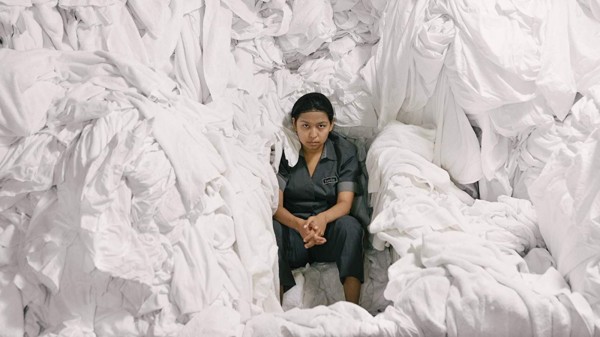
GABRIELA CARTOL IN THE CHAMBERMAID
A look at the working environment of a chambermaid in one of Mexico City's most luxurious hotels can be a counterpart to Cuaron's "Roma"
In her feature debut, theater director Lila Avilés turns the monotonous work day of Eve (Gabriela Cartol), a chambermaid at a high-end Mexico City hotel, into a beautifully observed film of rich detail. Set entirely in this alienating environment, with extended scenes taking place in the guest rooms, hallways, and cleaning facilities, this minimalist yet sumptuous movie brings to the fore Eve’s hopes, dreams, and desires. As with Alfonso Cuarón’s ROMA, set in the same city, The Chambermaid salutes the invisible women caretakers who are the hard-working backbone of society. A Kino Lorber release.
-NEW DIRECTORS/NEW FILMS festival listing. Jonathan Romney's Screen Daily review points out "Eve seems to be suspended in an eternal daytime present, as if she never actually leaves the premises." A slowly immersive film that leads you into quiet desperation (self submerged by routine, hope suppressed by low status) and, perhaps , back out the other side.
The Chambermaid/La camarista, 105 mins., debuted at Toronto; half a dozen other festivals including New Directors/New Films and San Francisco, screened as part of the latter, where it received the GGA New Directors Award with a $10,000 cash prize.
SFFILM showtimes:
Fri, Apr 19 at 6:00 pm Roxie Theater
Sun, Apr 21 at 3:15 pm Berkeley Art Museum/Pacific Film Archive
Last edited by Chris Knipp; 04-22-2019 at 01:35 PM.
-
CLOSE ENEMIES/FRÈRES ENNEMIS (David Oelhoffen 2018)
DAVID OELHOFFEN: CLOSE ENEMIES/FRÈRES ENNEMIS (2018)
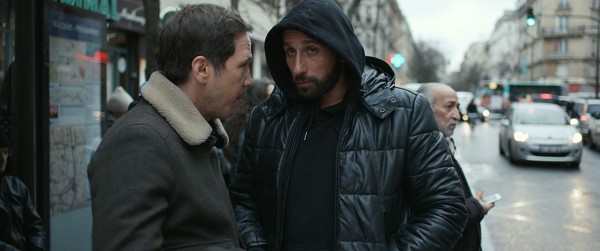
REDA KATEB AND MATTHIAS SCHOENAERTS IN CLOSE ENEMIES
Deeper ties
In contrast to the admirable but relentlessly unfun La camarista, it was tempting to say of this film that it's far too much fun to be in a festival. But seriously, its inclusion by SFFILM is justified by its superior quality. Even though this French polar (crime thriller) classifies superficially as a conventional police-drug actioner, there is excellence in every aspect. The whole package, writing, directing, image, pared-down score, is sleek and functional. The acting is fine starting with the leads, Matthias Schoenaerts and Reda Kateb. This is not stylistic greatness; another Jean-Pierre Melville hasn't come along. But enjoyment is justified by quality.
The theme is of two men who grew up in the same rough Paris cité but went to other sides, Manuel (Schoenaerts) into drug trafficking and Driss (Kateb) to detection and prevention of same, having just been promoted to stupe (the police narcotics division). We're not hit over the head, but the action starts off early and, above all, the sense of togetherness of the drug dealing clan, who first appear joyously greeting one of their number just released from prison, and a dad plays football with his tousle-haired kid, the only male in sight not wearing the look du jour, crewcut and tight leather jacket.
Barely more than twenty minutes into the film comes a sudden violent attack on Manuel and two of his associates in the back of a car. Manuel escapes, fairly shaken, but his two comrades, including Imrane Mogalia (Adel Bencherif), a man who was a mole for the cops, are taken out, as is the drug shipment. This crisis bonds Manuel and Driss once more, because it is a giant blow for both. The assailants are so far unknown as we follow the two men home where their loved ones sense they're shaken. More disturbing is the scene where Driss goes to tell his informant's wife that he's gone, so well done it gave me a catch in the throat.
The traumatic disruption obliges Driss to force Manuel to cooperate, but that leads Driss to feelings, perhaps, of betrayal. When he revisits his parents, he who has denied earlier to someone that he even knows Arabic, speaks to them in Arabic, recalling that the wallpaper he and his father put up together. He always found it ugly, he says. And then he switches to French, "Maintenant il me manque," "Now I miss it," the shift signaling his split personality and life. They do not even know where he lives now. A deft, heartfelt scene.
Close Enemies is an exploration of a classic dramatic theme: the way deeper ties emerge when individuals who have made their way into a certain profession or world are brought to the brink. We see at the outset how Manuel has been made an honorary member of an Arab drug clan, but after he almost dies and two of his closest frères, his affective brothers, have been wiped out on either side of him he is symbolically isolated, and as he flees what he thinks is certain death thereafter, he remains increasingly hidden and withdrawn inside his dark hoodie. Driss' own parents, still living in the poor banlieue, think him a danger to themselves now that he is with the police and elevated to the department whose aim is to fight the people he formerly was associated with. His role is ambiguous, conflicted. His female police superior thinks him a danger, and his old comrades think him a traitor, even as they may admire the mainstream success he has come into, however dubiously.
All this, in a French polar, constitutes satisfying and complex character development. It's been pointed out, though, that the two leads' families aren't much developed. And for all its excellence, I can't claim that Close Enemies transcends its conventional genre, because that's not what writer/director David Oelhoffen and co-writer, Jeanne Aptekman have set out to do. (see Boyd van Hoeij's admiring and eloquent review in Hollywood Reporter.) David Oelhoffen previously directed Viggo Mortensen in the 2014 Camus adaptation Far from Men/Loin des hommes.
Close Enemies/Frères ennemis, 111 mins., debuted at Venice Sept. 2018 and played at over half a dozen other festivals, including Busan, Warsaw, Göteborg, Cleveland, and the San Francisco Film Festival, where it was screened for this review.
SFFILM showtimes:
Sun, Apr 21 at 4:30 pm
Victoria Theatre
Mon, Apr 22 at 6:00 pm
Victoria Theatre
Last edited by Chris Knipp; 04-12-2019 at 10:43 AM.
-
A FAITHFUL MAN/L'HOMME FIDEL (Louis Garrel 2018)
LOUIS GARREL A FAITHFUL MAN/L' HOMME FIDÈLE (2018)
(Review originally written for the 2018 New York Film Festival.)
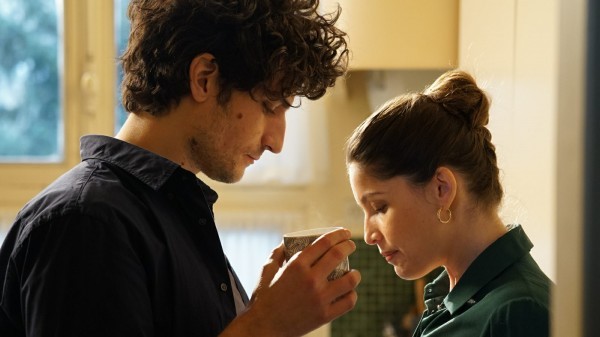
LOUIS GARREL AND LAETITIA CASTA IN L'HOMME FIDÈLE
Love and death: a quadrangle with a wise child
Louis Garrel's second film as director, co-scripted by the legendary Jean-Claude Carrière, is about a man (played by Garrel) whose girlfriend Marianne (Laetitia Casta) marries his best friend, then returns to him after her husband dies, but with the accompanying problems of a son who doesn't like him and troubling rumors about the husband's death.
In the opening, set earlier, Marianne gives Abel the bad news that his best friend Paul is the father of the child she's pregnant with, and she is choosing him over Abel. Abel walks out of her life not to return till nine years later.
Now Paul is dead, died in his sleep, it's said, and Marianne invites Abel - who's available - to come and see her. He meets her son, the nine-year-old Joseph (Joseph Engel). A pretty, self-assured boy he at once takes Abel aside and tells him "My mother killed my father." "How?" asks Abel. "Poison," says Joseph. This is a very choice scene, a little triumph that will stick in your mind.
Abel looks bemused, and we may laugh, but it's an arresting conversation that conjures up Highsmith filmed by Chabrol - or Hitchcock, whose murders often have humorous moments. You may say Joseph says this stuff to scare Abel away and have his mother to himself. But wait till you learn more about Joseph. The boy is an expert at solving mysteries and crime is his chief hobby. He's spent time with actual police and learned from them. Maybe he will grow up to be Chabrol, or Ozon. Or maybe this is just a joke. But not to Abel, who when Marianne serves him a hot tizane, eyes it nervously and only takes a sip.
The conversation between Joseph and Abel goes further. Marianne's own doctor, we learn, filled out the death certificate for Joseph's father without ordering an autopsy. Why was that? Abel asks Joseph. "My mother slept with him," he replies. He, Joseph, can't remember the doctor's name but it's the name of a flower, beginning with P. It takes Abel a while to think of the right flower, peony. And he goes and talks to Doctor Pivoine, who tells him that he is gay. Pivoine is not gay, Marianne says, and Abel sees Pivoine with a girlfriend. Another droll and provocative sequence.
Did Marianne sleep with Pivoine? We never find out. But it's evident Joseph doesn't like Abel. No secret about that. He says so. Nonetheless Marianne takes Abel in to live with her, so Abel "steals" Joseph's mother, as he puts it to Abel later.
The film pitches us a new curve ball: Paul's younger sister, Eve (Lily-Rose Depp), who enters the picture to tell her story in voiceover. She talks of nothing but her love for Abel, who she says she's been mad about since she was a girl, carrying photos of him everywhere and thinking of him constantly. Now neither a girl, nor an adolescent, nor a virgin, she presents herself to Abel and declares her lust for him. She asks, and he admits, "physically" he indeed finds her very pretty.
Marianne herself suggests that perhaps Abel should try Eve, sleep with her a few times, just to see whom he prefers. This turns out to mean taking his things to Eve's little student apartment-room: Abel can't be coming back to Marianne's place every night during the process. It goes on for a while.
Till Joseph steps in again. He had reassured Eve earlier of her good prospects with Abel by telling her his mother and Abel were not having sex that much. He could prove it. He made recordings of them under the bed with his iPhone.
But then he turns Eve off to Abel with one of his little jaw-dropping pronouncements: "My mother told Abel to come to you," he says - which is true, of course. When Abel returns to Eve's flat he finds his things packed up and stacked outside the door.Things were not going that well anyway, for Eve. Whenever she had sex in the past, she always fantasized Abel. But when she has sex with Abel, who can she fantasize? She thinks the sex was better when it was inspired by Abel than is has been with Abel.
A discussion between Abel and Marianne reveals that she was sleeping with him and her late husband at the same time, and she doesn't know who the father of Joseph really is. Moreover, she really loved Abel more, but she wasn't able to choose between the two men and to do so, flipped a coin, and Abel lost. She regretted that, but the die was cast.
This a film as classically, quintessentially French as you could ever want, and Louis Garrel, who became a star with other directors, notably as the muse of Christophe Honoré, is steeped in French cinematic tradition with an actor grandfather and director father. Yet as Garrel has said, he does "terrible things" in this film. Isn't it taboo to mimic the French New Wave? Yet here in L'homme fidèle he has voiceovers, apartments, two women and a man, coffee - all the Nouvelle Vague stuff Godard, Truffaut, et al. are known for.
But he has this excellent cast, including himself, and this precocious boy of nine. Garrel himself is handsome in a very special way, is photographed as flatteringly as ever in his own films, and brings sexiness and wit and a light touch to his performance here that centers the film. Laetitia Casta, his real-life wife, is a memorable beauty with shimmering pale blue eyes. (In the Gainsbourg biopic she played Brigitte Bardot.) Lily-Rose Depp is the daughter of a famous French beauty and Johnny Depp. Here she is as fresh as a flower blooming in the rain.
The star of the show is Joseph Engel, though. Joseph is the pivot-point and premise of the film. It is his provocations that start the reverberations. Moreover, he isn't just a preternaturally wise, Shakespearean-style child - though at one point Abel declares that he doesn't know how to talk to children. Talking to them like adults isn't right. But when he talks to them like a kid that doesn't work either. In other words, he is no ordinary child. But he is a piece carved out of Louis Garrel's own past. Laugh if you want, it wasn't so funny for little Louis at the time.
At the New York Film Festival Lily-Rose Depp, Laetitia Casta, and Louis Garrel were all present for the Q&A, and Garrel talked a blue streak. His English was a bit halting years ago but now he is fully able to "se débrouiller," as the French say, he can "get by" very well, while a certain remaining roughness seems to free him to say franker or funnier things than might come out in French. At Lincoln Center, he was full of ideas and funny, and revealing, especially talking about himself as a child of divorced parents acting in one of his father's films when he was six, where his mother was in a scene sleeping with another man, and his father with another woman, and he wasn't dead certain what was fake and what was true.
About Joseph, Garrel said you need to remember that at nine a boy already "knows everything." He also admitted that he himself recorded his mother under her bed - like the boy in the film, to see if she was having sex.
L'Homme fidel is in some ways simpler, fresher, and more playful than a Nouvelle Vague film. It's also more precisely constructed and carefully paced than Garrel's directorial debut Two Friends, which had more frenetic activity and more improvisation. This is a puzzler that alludes to Marivaux, and also delves into Freudian aspects of childhood, while delighting in leaving questions unanswered. Its final scene, a silent one, has that aspect of classic comedy in that the three adults are all united, holding hands behind Joseph. He had disappeared, and is found again. This is a fluent, splendidly economical, elegant and delightful film that fulfills all the promise of Garrel's directorial debut and goes beyond it. Next perhaps as Jordan Mintzer says in his Variety review penned at Toronto, he should break free a little further from tradition and introduce more elements purely his own.
A Faithful Man/L'homme fidel, 75 mins., debuted at Toronto 9 Sept. 2018, also showing at San Sebastién, Zurich, and the New York Film Fesival, where it was screened for this review 7 Oct. 2018. It comes to French cinemas the day after Christmas.
The Metascore (but only on the basis of 6 reviews) is 64%, a slur from anglophone critics, while the AllCiné press rating is 3.7, showing the French appreciation, especially considering a high rating comes from the hard-to-please Cahiers. Nicolas Schaller of Le Nouvelle Observateur wrote, "At once light and profound, always elegant." There you have it.
SFFILM showtimes:
Fri, Apr 12 at 6:30 pm Roxie Theater
Wed, Apr 17 at 6:00 pm YBCA - AT RUSH!
Last edited by Chris Knipp; 04-17-2019 at 01:02 PM.
-
FIRST NIGHT NERVES/八個女人一台戲 (Stanley Kwan 2018)
STANLEY KWAN (Jinpang Guan): FIRST NIGHT NERVES/八個女人一台戲 (2018)
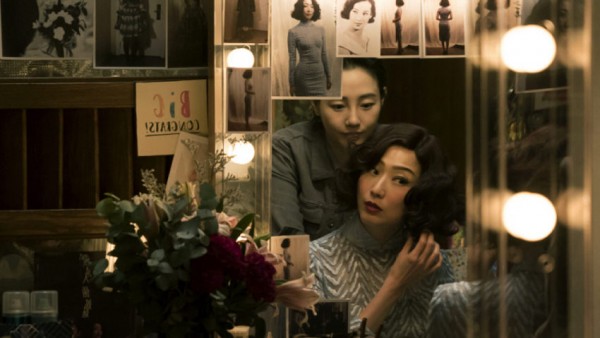
Unusually detailed IMDb summary HERE.
Audiences looking for the next “Crazy Rich Asians” might take some delight in Stanley Kwan’s diva-licious “First Night Nerves,” a “Feud”-like behind-the-scenes rivalry which forces center stage all the drama between high-maintenance Hong Kong actresses Yuan Xiuling (Sammi Cheng) and He Yuwen (Gigi Leung). Set during the final week of rehearsals for a new play called “Two Sisters,” the film feels soapier than a broken dishwasher, but that’s not necessarily a bad thing for audiences who relish the chance to watch actresses display their full range of emotion in a movie that gives even the smallest female parts more dimension than most movies offer their ostensible leading ladies.
One of Hong Kong’s only openly gay directors, Kwan has crafted a movie that’s nearly Almodóvarian in the appreciation and respect it showers upon ladies of all classes — not just the city’s Ferrari-driving super-elite, but also the loyal assistants who cook and console our dueling stars.
-Peter Debruge, Variety
People often say that the heyday of Hong Kong cinema is gone. The Hong Kong film here refers to films made in Cantonese language, through Hong Kong studios, directors, and subsided by Hong Kong capital. The directors and actors who led the Hong Kong film industry have headed to Hollywood or started their new journey in mainland China, not their home, after finishing their mission.
Stanley Kwan, who once was a symbol of Hong Kong cinema and who led Hong Kong’s New Wave movement, questions this common notion. He talks about a new way of making films that Hong Kongers can go to with his film First Night Nerves.
- Marie Lee, Asian Movie Pulse
First Night Nerves, 100 mins., debuted at Busan Oct. 2018; also shown at Singapore Dec. 2018. Now included in the San Francisco Film Festival.
SFFILM showtmes:
Thu, Apr 11 at 8:00 pm BAMPFA (EVENT HAS PASSED)
Sat, Apr 13 at 7:30 pm SFMOMA Phyllis Wattis Theater (EVENT HAS PASSED)
Fri, Apr 19 at 1:00 pm YBCA - AT RUSH!
Last edited by Chris Knipp; 04-15-2019 at 07:16 AM.
-
HARVESTERS, THE/DIE STROPERS (Etienne Kallos 2018)
ETIENNE KALLOS: THE HARVESTERS/DIE STROPERS (2018)
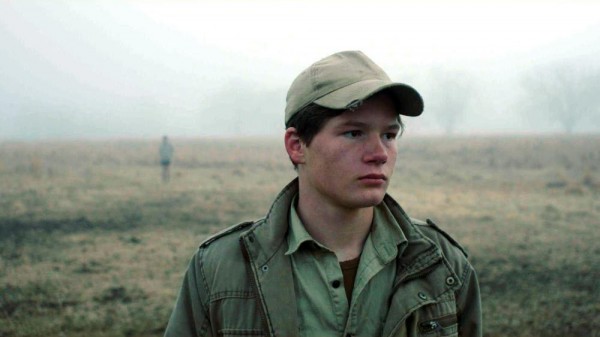
ALEX VERMEULEN IN THE HARVESTERS
[PREVIEW ONLY]
A brooding Afrikans debut
South Africa, Free State region, isolated stronghold to the dwindling Afrikaans white ethnic minority culture. In this conservative farming territory obsessed with strength and masculinity, Janno is different, secretive, emotionally frail. One day his mother, fiercely religious like the whole family, brings home Pieter, a hardened street orphan she wants to save, and asks Janno to make this stranger into his brother. The two boys start a fight for power, heritage and parental love. The film got a standing ovation at its debut in Un Certain Regard at Cannes. In the lead as Janno, beefy and rugby-playing but soft-faced youth Alex Vermeulen is a feat of perfect casting, and as his sudden opponent Pieter, Alex van Dyk isn't far behind. The Greek-descent director, who grew up in the Free State, and has won awards for shorts, returned home for this moody debut with its unique grand, harsh landscape and minimal music. This strange world reminded me of Carlos Reygadas' Silent Light (NYFF 2007). For some background see here; for aVariety review by Guy Lodge, here.
SFFILM showtimes:
Sat, Apr 20 at 6:30 pm Roxie Theater
Sun, Apr 21 at 3:45 pm Roxie Theatre

ALEX VAN DYK AND ALEX VERMEULEN IN THE HARVESTERS
Last edited by Chris Knipp; 04-12-2019 at 03:46 PM.
 Posting Permissions
Posting Permissions
- You may not post new threads
- You may not post replies
- You may not post attachments
- You may not edit your posts
-
Forum Rules





 Reply With Quote
Reply With Quote







Bookmarks